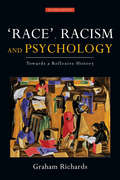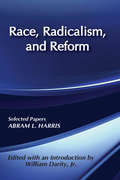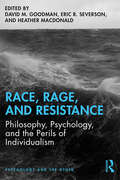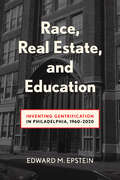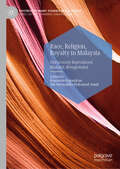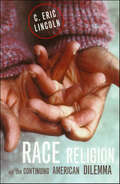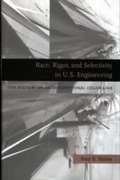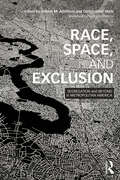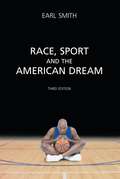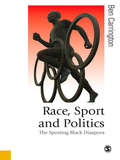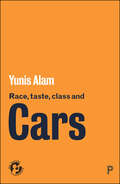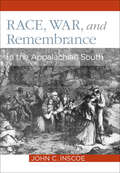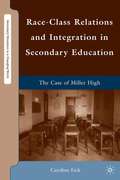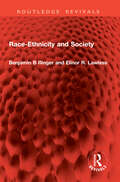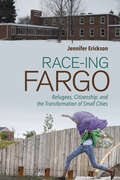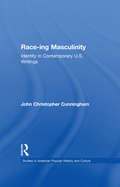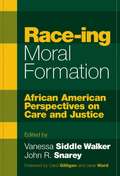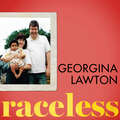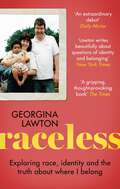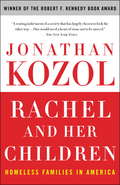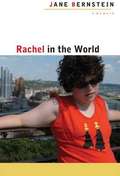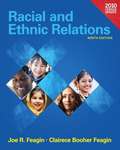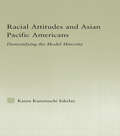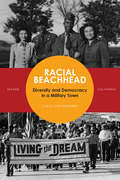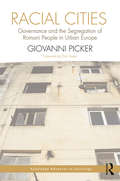- Table View
- List View
Race, Racism and Psychology, 2nd Edition: Towards a Reflexive History
by Graham RichardsThis book offers a comprehensive overview of the ways in which Psychology has engaged with 'race' and racism issues since the late 19th century. It emphasizes the complexities and convolutions of the story and attempts to elucidate the subtleties and occasional paradoxes that have arisen as a result. This new edition updates the research contained in the first edition and includes brand new chapters. These additional chapters draw attention to the importance of the South African Black Consciousness movement and ‘Post-colonial’ Psychology, ?explore recent additional historical research on the fears of ‘hybridisation’, contain new material on French colonial psychiatry, and discuss the awkward status of virtually all the language and terms currently used for discussion of the topic. This important and controversial book has proved to be a vital text, both as a point of departure for more in-depth inquiries, and also as an essential reference tool.The additional up-to-date material included in this new edition makes the book an even more valuable resource to those working in and studying psychology, and also for anyone concerned with the ‘race’ issue either professionally or personally.
Race, Rage, and Resistance: Philosophy, Psychology, and the Perils of Individualism (Psychology and the Other)
by Eric R. Severson Heather Macdonald David M. GoodmanThis timely collection asks the reader to consider how society’s modern notion of humans as rational, isolated individuals has contributed to psychological and social problems and oppressive power structures. Experts from a range of disciplines offer a complex understanding of how humans are shaped by history, tradition, and institutions. Drawing upon the work of Lacan, Fanon, and Foucault, this text examines cultural memory, modern ideas of race and gender, the roles of symbolism and mythology, and neoliberalism’s impact on psychology. Through clinical vignettes and suggested applications, it demonstrates significant alternatives to the isolated individualism of Western philosophy and psychology. This interdisciplinary volume is essential reading for clinicians and anyone looking to augment their understanding of how human beings are shaped by the societies they inhabit.
Race, Real Estate and Education: Inventing Gentrification in Philadelphia, 1960-2020 (Urban Life, Landscape and Policy)
by Edward M. EpsteinPhiladelphia’s urban renewal efforts in the 1950s, which re-envisioned the city as a residential enclave, were an early example of gentrification. In West Philadelphia in the 1960s, a coalition of universities and hospitals went further, initiating K-12 public school improvements meant to attract an affluent and whiter population. As Edward Epstein details in Race, Real Estate, and Education, these interventions discounted the negative impact they could have on neighborhood residents. Epstein outlines the citywide context for the plan to create “University City” in West Philadelphia. He recounts the attempts to correct the segregation, overcrowding, and authoritarian management that plagued Philadelphia’s public schools. As the West Philadelphia Corporation, the proxy for the universities and hospitals, initiated gentrification efforts, the local community resisted and protested, causing the project to fail. The effort was revived with spectacular success, however, with the launch of the well-funded Penn Alexander School in 2001. Race, Real Estate, and Education shows how the pursuit of urbanist ideals sometimes deepens neighborhood injustice. Epstein’s exploration of whether Philadelphia’s overall approach was beneficial or misguided presents a cautionary tale. In the series Urban Life, Landscape, and Policy
Race, Religion, Royalty in Malaysia: Discursively Reproduced, Resisted, Renegotiated (Postdisciplinary Studies in Discourse)
by Kumaran Rajandran Siti Nurnadilla Mohamad JamilThis edited volume conducts linguistic and literary analyses of the discourse involving race, religion and royalty (3R) in Malaysia. Grounded in Discourse Studies, it reveals the language features and strategies that articulate the vitality of 3R in historical and contemporary texts in English and Malay. The chapters employ language-based approaches to generate empirical explanations on 3R in multiple contexts. This volume is of interest to scholars, advanced undergraduate students and graduate students in Language, Linguistics and Literature to understand the discursive contours of race, religion and royalty in Asia.
Race, Religion, and the Continuing American Dilemma
by C. Eric LincolnA classic work on religion and the racial problems of modern america -now brought up to date.Since the early days of the Republic, Americans' exuberant, unchastened idealism, their commitment to the notion of a perfect society in the New World, has clashed with the reality of ugly American society, and religious groups have all too often accommodated themselves to these injustices.In Race, Religion, and the Continuing American Dilemma, C. Eric Lincoln reevaluates what Gunnar Myrdal called "the American dilemma" and studies particularly the influence of the black church. This revised edition takes into account the weakening of welfare and affirmative action, and argues that the black church must serve today as a vital moral authority to lead us in to the twenty-first century..
Race, Rigor, and Selectivity in U.S. Engineering: The History of an Occupational Color Line
by Amy Slaton<p>Despite the educational and professional advances made by minorities in recent decades, African Americans remain woefully underrepresented in the fields of science, technology, mathematics, and engineering. Even at its peak, in 2000, African American representation in engineering careers reached only 5.7 percent, while blacks made up 15 percent of the U.S. population. Some forty-five years after the Civil Rights Act sought to eliminate racial differences in education and employment, what do we make of an occupational pattern that perpetually follows the lines of race? <p>Race, Rigor, and Selectivity in U.S. Engineering pursues this question and its ramifications through historical case studies. Focusing on engineering programs in three settings—in Maryland, Illinois, and Texas, from the 1940s through the 1990s—Amy E. Slaton examines efforts to expand black opportunities in engineering as well as obstacles to those reforms. Her study reveals aspects of admissions criteria and curricular emphases that work against proportionate black involvement in many engineering programs. Slaton exposes the negative impact of conservative ideologies in engineering, and of specific institutional processes—ideas and practices that are as limiting for the field of engineering as they are for the goal of greater racial parity in the profession.</p>
Race, Space, and Exclusion: Segregation and Beyond in Metropolitan America (The Metropolis and Modern Life)
by Robert M. Adelman and Christopher MeleThis collection of original essays takes a new look at race in urban spaces by highlighting the intersection of the physical separation of minority groups and the social processes of their marginalization. Race, Space, and Exclusion provides a dynamic and productive dialogue among scholars of racial exclusion and segregation from different perspectives, theoretical and methodological angles, and social science disciplines. This text is ideal for upper-level undergraduate or lower-level graduate courses on housing policy, urban studies, inequalities, and planning courses.
Race, Sport And The American Dream (Third Edition)
by Earl SmithRace, Sport and the American Dream reports the main findings of a long term research project investigating the scope and consequences of the deepening relationship between African American males and the institution of sport. While there is some scholarly literature on the topic, author Earl Smith tries to understand through this project how sport has changed the nature of African American Civil Society and has come to be a major influence on economic opportunities, schooling and the shaping of African American family life. <p><p> The third edition of Race, Sport and the American Dream improves upon the second edition in four key ways: (1) by updating the empirical data so that it is the most current on the market, (2) by expanding the discussion of the Athletic Industrial Complex (AIC) to include a robust discussion of the explosion of Conference Realignment, (3) by expanding the discussion of leadership in SportsWorld to include the most current theory in the area of sports management and (4) by adding an entirely new chapter on male athletes and violence against women. <p> In addition, the third edition expands the discussion of the elusive American Dream and the role of sports in accessing better life chances, success and happiness. The third edition of Race, Sport and the American Dream also includes a discussion of the increased role that social media plays in SportsWorld by allowing everyone and anyone to become a ''sports critic'' as well as a discussion of race in SportsWorld in the era of changing the racial landscape of the US. Specifically, the US has become more racially diverse and critics are debating the role that the election of the first African American president plays in this changing landscape. All in all, the third edition of Race, Sport and the American Dream expands on existing discussions and provides new areas of inquiry. This book is intended to provide social scientists and others interested in sports with an understanding of carefully selected issues related to the African American athlete. Smith examines the world of amateur sports (Olympic and intercollegiate sport) using Immanuel Wallerstein's ''World-Systems Paradigm'' which provides a lens with which to examine the colonizing and exploitative nature of intercollegiate sports and the special arrangements that universities have with SportsWorld. <p> All of the topics in this book are addressed within the context of the history of racial oppression that has dominated race relations in the United States since its inception as a nation-state in the 1620s. Across a variety of topics including sport as big business--which Smith terms the Athletic Industrial Complex--to criminal behavior by athletes, to the lack of leadership opportunities for African American athletes, to the question of the biological superiority of African American athletes, Smith argues that any discussion of race and sport must be understood within this context of power and domination. Otherwise the importance of the question itself will always be (a) misunderstood or (b) underestimated.
Race, Sport and Politics: The Sporting Black Diaspora (Published in association with Theory, Culture & Society)
by Ben CarringtonWritten by one of the leading international authorities on the sociology of race and sport, this is the first book to address sport's role in 'the making of race', the place of sport within black diasporic struggles for freedom and equality, and the contested location of sport in relation to the politics of recognition within contemporary multicultural societies. Race, Sport and Politics shows how, during the first decades of the twentieth century, the idea of 'the natural black athlete' was invented in order to make sense of and curtail the political impact and cultural achievements of black sportswomen and men. More recently, 'the black athlete' as sign has become a highly commodified object within contemporary hyper-commercialized sports-media culture thus limiting the transformative potential of critically conscious black athleticism to re-imagine what it means to be both black and human in the twenty-first century. Race, Sport and Politics will be of interest to students and scholars in sociology of culture and sport, the sociology of race and diaspora studies, postcolonial theory, cultural theory and cultural studies.
Race, Taste, Class and Cars: Culture, Meaning and Identity (21st Century Standpoints)
by Yunis AlamLove them or hate them, most of us have an opinion about cars. If not the cars themselves, then it’s driver competence and behaviour that can offend us. And then there’s modification: alloy wheels, custom audio systems and bespoke paint jobs. For some, changing the look, feel and sound of a car says something about themselves, but for others, such enhancements signify a lack of taste, or even criminality. In subtle and complex ways, cars transmit and modify our identities behind the wheel. As a symbol of independence and freedom, the car projects status, class, taste and, significantly, embeds racialisation. Using fascinating research from drivers, including first-person accounts as well as exploring hip-hop music and car-related TV shows, Alam unpicks the ways in which identity is rehearsed, enhanced, interpreted.
Race, War, and Remembrance: in the Appalachian South
by John C. Inscoe“A significant contribution to the current understanding of southern Appalachia’s place within the South and the nation.” —The Journal of American HistoryAmong the most pervasive of stereotypes imposed upon southern highlanders is that they were white, opposed slavery, and supported the Union before and during the Civil War, but the historical record suggests far different realities. John C. Inscoe has spent much of his scholarly career exploring the social, economic and political significance of slavery and slaveholding in the mountain South and the complex nature of the region’s wartime loyalties.Drawing on the memories, memoirs, and other testimony of slaves and free blacks, slaveholders and abolitionists, guerrilla warriors, invading armies, and the highland civilians they encountered, Inscoe’s essays consider a multiplicity of perspectives and what is revealed about highlanders’ dual and overlapping identities as both a part of, and distinct from, the South as a whole. Devoting attention to how truths from these contemporary voices were exploited, distorted, reshaped, reinforced, or ignored by later generations, he considers novelists, journalists, filmmakers, dramatists, and even historians over the course of the late nineteenth and twentieth centuries and how their work has contributed much to either our understanding?or misunderstanding?of nineteenth century Appalachia and its place in the American imagination.“Each essay is a gem of historical and critical analysis that adds greatly to our understanding of the Appalachian past.” —Dwight Billings, coeditor of Appalachia in the Making: The Mountain South in the Nineteenth Century
Race-Class Relations and Integration in Secondary Education
by Caroline EickEick explores the history of a comprehensive high school from the world views of its assorted student body, confronting issues of race, ethnicity, class, gender, nationality, and religion. Her case study examines the continuities and differences in student relationships over five decades.
Race-Ethnicity and Society (Routledge Revivals)
by Benjamin B Ringer Elinor R. LawlessFirst published in 1989, Race-Ethnicity and Society comes as a usable and comprehensive text on race and ethnicity in the United States. Ringer and Lawless set out to fill the gap in the literature by incorporating the “positive lessons” of the racially turbulent 1960's and 70s. Proposing a challenge to three conventional premises of many texts, they argue that the treatment of racial minorities in America was qualitatively different from that experienced by the white immigrants; that racism was not a mere aberration in American Society but was built into the very foundations of the society; and that America's experience with minorities was not unique but can instead be located within the mainstream of European expansion and conquest.Race-Ethnicity and Society will be a standard source for students in the fields of sociology, history, and political science.
Race-ing Fargo: Refugees, Citizenship, and the Transformation of Small Cities
by Jennifer EricksonTracing the history of refugee settlement in Fargo, North Dakota, from the 1980s to the present day, Race-ing Fargo focuses on the role that gender, religion, and sociality play in everyday interactions between refugees from South Sudan and Bosnia-Herzegovina and the dominant white Euro-American population of the city. Jennifer Erickson outlines the ways in which refugees have impacted this small city over the last thirty years, showing how culture, political economy, and institutional transformations collectively contribute to the racialization of white cities like Fargo in ways that complicate their demographics. Race-ing Fargo shows that race, religion, and decorum prove to be powerful forces determining worthiness and belonging in the city and draws attention to the different roles that state and private sectors played in shaping ideas about race and citizenship on a local level. Through the comparative study of white secular Muslim Bosnians and Black Christian Southern Sudanese, Race-ing Fargo demonstrates how cross-cultural and transnational understandings of race, ethnicity, class, and religion shape daily citizenship practices and belonging.
Race-ing Masculinity: Identity in Contemporary U.S. Writings (Studies in American Popular History and Culture)
by John Christopher CunninghamFirst published in 2002. Routledge is an imprint of Taylor & Francis, an informa company.
Race-ing Moral Formation: African American Perspectives on Care and Justice
by Vanessa Siddle Walker John R. SnareyIn this volume the editors incorporate the experiences of African Americans into the discourse on moral-development theory and moral education. By citing historical developments from the days of slavery to the present, the authors provide a framework through which one can interpret the way morality has been cultivated amongst Black minorities. Presenting intriguing essays of well-known African American scholars, the editors discuss both the psychology of moral formation among African American children, adolescents, and adults, and the practical implications of this knowledge.
Raceless: Exploring race, identity and the truth about where I belong (Language Acts and Worldmaking #25)
by Georgina LawtonA GUARDIAN, SUNDAY TIMES, EVENING STANDARD AND COSMOPOLITAN BOOK OF THE YEAR FOR 2021In Georgina Lawton's childhood home, her Blackness was never acknowledged; the obvious fact of her brown skin, ignored by her white parents. Over time, secrets and a complex family story became accepted as truth and Georgina found herself complicit in the erasure of her racial identity.It was only when her beloved father died that the truth began to emerge. Fleeing the shattered pieces of her family life and the comfortable, suburban home she grew up in, at age 22 Georgina went in search of answers - embarking on a journey that took her around the world, to the DNA testing industry, and to countless others, whose identities have been questioned, denied or erased.What do you do when your heritage or parentage has been obscured in a complex web of deceit? How can you discuss race with your family, when you each see the world differently? When a personal identity has been wrongly constructed, how do you start again?Raceless is a beautifully-written true account of a young woman seeking her own story amid devastating family secrets. For readers of powerful, moving books about family, growing up and identity, such as My Name is Why by Lemn Sissay and Educated by Tara Westover.
Raceless: In Search of Family, Identity, and the Truth About Where I Belong
by Georgina Lawton'A jaw-dropping story, told deftly... a gripping, thought-provoking book.' The Sunday Times'Freshly fascinating. [Lawton] is a particularly astute observer of the psychological dislocation caused by growing up mixed race... and she writes beautifully about questions of identity and belonging, so central to each of us in finding our particular place in the world.' New York Times Book Review'A poignant and eye opening memoir...a nuanced and crucial dissection of race as a construct.' Yomi Adegoke, co-author of Slay in Your Lane'A beautifully written account of an extraordinary story, Raceless is as eye-opening as it is profound.' Otegha UwagbaA Guardian, Sunday Times, Evening Standard and Cosmopolitan book of the year for 2021'Ideas from our parents form the backbone to our identities, the bedrock to personal truths that we recite and remember like prayers from Church or poems from school. But they condition us in more powerful ways than lessons from any book or religion ever could. Now the tale had been destroyed. So what did that mean about who I thought I was?'In Georgina Lawton's childhood home, her Blackness was never acknowledged; the obvious fact of her brown skin, ignored by her white parents. Over time, secrets and a complex family story became accepted as truth and Georgina found herself complicit in the erasure of her racial identity. It was only when her beloved father died that the truth began to emerge. Fleeing the shattered pieces of her family life and the comfortable, suburban home she grew up in, at age 22 Georgina went in search of answers - embarking on a journey that took her around the world, to the DNA testing industry, and to countless others, whose identities have been questioned, denied or erased.What do you do when your heritage or parentage has been obscured in a complex web of deceit?How can you discuss race with your family, when you each see the world differently? When a personal identity has been wrongly constructed, how do you start again? Raceless is both the compelling personal account of a young woman seeking her own story amid devastating family secrets, and a fascinating, challenging and essential examination of modern racial identity.
Rachel and Her Children: Homeless Families in America
by Jonathan KozolThe story that jolted the conscience of the nation when it first appeared in The New Yorker. Jonathan Kozol is one of America's most forceful and eloquent observers of the intersection of race, poverty, and education. His books, from the National Book Award-winning Death at an Early Age to his most recent, the critically acclaimed Shame of the Nation, are touchstones of the national conscience. First published in 1988 and based on the months the author spent among America's homeless, Rachel and Her Children is an unforgettable record of the desperate voices of men, women, and especially children caught up in a nightmarish situation that tears at the hearts of readers. With record numbers of homeless children and adults flooding the nation's shelters, Rachel and Her Children offers a look at homelessness that resonates even louder today.
Rachel in the World: A Memoir
by Jane BernsteinWhat happens when love is no longer enough? Jane Bernstein thought that learning to accept her daughter's disabilities meant her struggles were over. But as Rachel grew up and needed more than a parent's devotion, both mother and daughter were confronted with formidable obstacles. Rachel in the World, which begins in Rachel's fifth year and ends when she turns twenty-two, tells of their barriers and successes with the same honesty and humor that made Loving Rachel, Bernstein's first memoir, a classic in its field. The linked accounts in part 1 center on family issues, social services, experiences with caregivers, and Rachel herself--difficult, charming, hard to fathom, eager for her own independence. The second part of the book chronicles Bernstein's attempt to find Rachel housing at a time when over 200,000 Americans with mental retardation were on waiting lists for residential services. As Rachel prepares to leave her mother's constant protection, Bernstein invites the reader to share the frustrations and unexpected pleasures of finding a place for her daughter, first in her family, and then in the world.
Racial And Ethnic Relations: Census Update
by Joe R. Feagin Clairece Booher FeaginRacial and Ethnic Relations, 9/e examines the "what", "why", and "how" of racial and ethnic oppression and conflict. Drawing on a broad array of sources, this text provides readers with access to important research and literature on racial and ethnic groups in the United States and, to a lesser extent, in certain other countries around the globe. It is designed for courses in Majority-Minority Relations, Racial and Ethnic Relations, Cultural Diversity, and Multiculturalism in departments of Sociology and Ethnic Studies. The Census Update program incorporates 2010 Census data into a course--simply and easily. The components of the Census Update Program include an updated census edition with all charts and graphs--to reflect the results of the 2010 Census.
Racial Attitudes and Asian Pacific Americans: Demystifying the Model Minority (Studies in Asian Americans)
by Karen Kurotsuchi InkelasThis study examines the complex sources and implications of the racial attitudes of Asian Pacific American (APA) college students, who, as one of the fastest growing demographics in higher education enrollments, play an increasingly significant role in campus race relations.
Racial Beachhead
by Carol Lynn MckibbenIn 1917, Fort Ord was established in the tiny subdivision of Seaside, California. Over the course of the 20th century, it held great national and military importance—a major launching point for World War II operations, the first base in the military to undergo complete integration, the West Coast's most important training base for draftees in the Vietnam War, a site of important civil rights movements—until its closure in the 1990s. Alongside it, the city of Seaside took form. Racial Beachhead offers the story of this city, shaped over the decades by military policies of racial integration in the context of the ideals of the American civil rights movement. Middle class blacks, together with other military families—black, white, Hispanic, and Asian—created a local politics of inclusion that continues to serve as a reminder that integration can work to change ideas about race. Though Seaside's relationship with the military makes it unique, at the same time the story of Seaside is part and parcel of the story of 20th century American town life. Its story contributes to the growing history of cities of color—those minority-majority places that are increasingly the face of urban America.
Racial Cities: Governance and the Segregation of Romani People in Urban Europe (Routledge Advances in Sociology)
by Giovanni PickerGoing beyond race-blind approaches to spatial segregation in Europe, Racial Cities argues that race is the logic through which stigmatized and segregated "Gypsy urban areas" have emerged and persisted after World War II. Building on nearly a decade of ethnographic and historical research in Romania, Italy, France and the UK, Giovanni Picker casts a series of case studies into the historical framework of circulations and borrowings between colony and metropole since the late nineteenth century. By focusing on socio-economic transformations and social dynamics in contemporary Cluj-Napoca, Pescara, Montreuil, Florence and Salford, Picker detects four local segregating mechanisms, and comparatively investigates resemblances between each of them and segregation in French Rabat, Italian Addis Ababa, and British New Delhi. These multiple global associations across space and time serve as an empirical basis for establishing a solid bridge between race critical theories and urban studies. Racial Cities is the first comprehensive analysis of the segregation of Romani people in Europe, providing a fine-tuned and in-depth explanation of this phenomenon. While inequalities increase globally and poverty is ever more concentrated, this book is a key contribution to debates and actions addressing social marginality, inequalities, racist exclusions, and governance. Thanks to its dense yet thoroughly accessible narration, the book will appeal to scholars, undergraduate and postgraduate students, postdoctoral researchers, and equally to activists and policy makers, who are interested in areas including: Race and Racism, Urban Studies, Governance, Inequalities, Colonialism and Postcolonialism, and European Studies.
